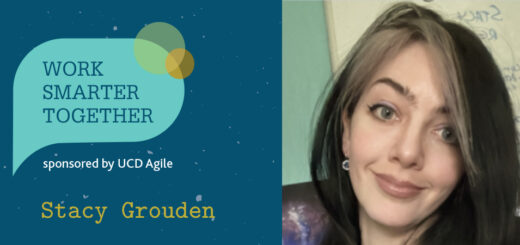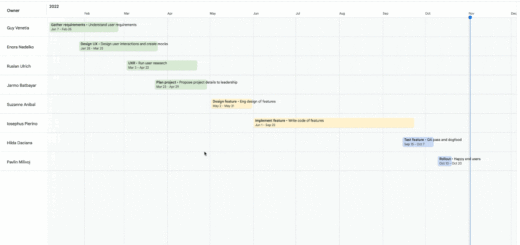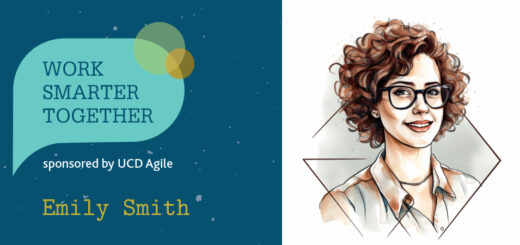Dr. Arjumand Younus – A Day in the Life
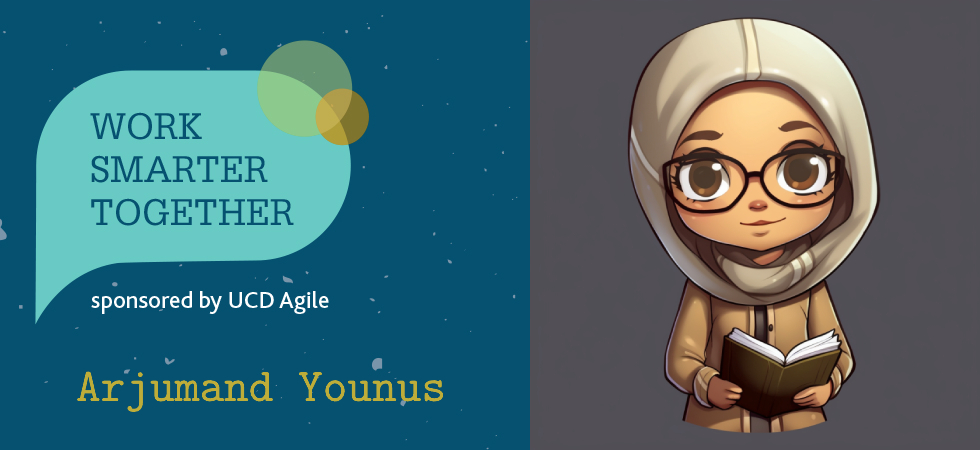 This interview was conducted over Zoom and has been edited for length and clarity.
This interview was conducted over Zoom and has been edited for length and clarity.
Donna Carroll: Who are you?
Arjumand Younus: So I’m Dr. Arjumand Younus. At the moment, I’m an assistant Professor of Computational Social Science in the School of Sociology. Before that, I was a research scientist in an AI company. So I’ve been in Academia, research, all of these things since the time of my PhD In 2011.
DC: Were you always kind of moving through sociology to get involved in machine learning and AI and those kinds of developments? Or was this a pivot from an initial plan?
AY: So, here’s the thing, my undergrad was in computer science from Pakistan. In undergrad, you study all the basic subjects in computer science, like operating systems, theory of computer science, programming languages. Machine learning was not so hot back then but then, when I moved to South Korea for my master’s program on a scholarship in one of the top universities of South Korea, which is also known as Asian Mit called KAIST (Korea Advanced Institute of Science & Technology), there I saw a wide range of research in AI and the research groups like that; that’s where I took the decision okay, this is what I want to do in the future. So yeah, you can say, that was around in 2010 ,
DC: One of the main concerns in learning in another country is often the language, was it taught through English?
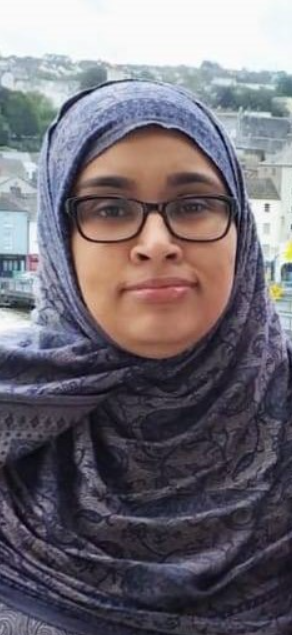
Dr Arjumand Younus
AY: It’s in English, because KAIST (Korea Advanced Institute of Science & Technology), is an international university; they teach all of their courses in English. There were some hurdles. It was a research masters, we had to work in a lab so there were some hurdles around speaking with colleagues, postdocs and PhDs, but with time they learned from me, and I learned from them.
DC: When I was researching and looking at your bio I saw that you seem to be very involved in representation of women and tech. Is that something that you’ve always cared about? Is that something that you’re able to pursue teaching in UCD?
AJ: This is something I always cared about, too, because back home there are not many people to guide and I come from a very working class background. My father sold ice cream but then he got his own business, and so from there I know it’s a huge struggle to work from the ground up to something as prestigious as academia so I’ve always been into helping whoever comes to me for advice, or the teaching or anything. This is something that has been my passion. In 2013, 2012, I started blogging about what I learned in all these countries, because I thought, Okay, I’m privileged enough to get a scholarship to pursue my passion so why not share with others back home? Then one thing led to another, I got a Google, Women Technical Scholarship [Generation Google Scholarship (EMEA)] for my role in that and now people still come to me for mentorship and all that so it has been my passion from early on.
DC: How did you end up in UCD?
AY: I did my PhD In Galway, it was a 4 year PhD 2011 – 15, from South Korea. I wanted to do a PhD. I had decided at that point Okay, Masters by research was fun, now let’s do a PhD. I had an offer from my South Korean professor but the one problem about South Korea was work-life balance, they can work 18 hours a day and I was like, no, I want to start a family, this is not gonna work, maybe try Europe – France, Netherlands, Ireland. I got this secured scholarship in these places. I started in Ireland because I got the scholarship, and here I am. Then, after finishing my PhD I applied to a postdoc in UCD and then I did another postdoc in UCD and then I moved to industry for a bit, and then became a lecturer in UCD.
DC: Is being a lecturer an extension of your interest in helping and guiding other people? Or is it a combination of that, and getting to be at the forefront of the industry and the research? Or is it something else?
AY: I would say, combination, because you get to do research and teaching. Mentorship is something I love, giving back to people; I really like when a student comes and tells me – Oh, you told me this, and your lecture helped me with this particular interview. There’s the smile that brings to their face is something I really like. So that’s one thing. And then I also get to enjoy research, studying what’s new, how AI is affecting society, how it can bring about social good. Then also the ethical implications. What are the things to look out for? It helps me keep in touch with both of my passions.
DC: What are your main responsibilities in your UCD role?
AY: So it’s teaching and research. We have 3 modules a year. Last semester, I taught AI in society, basically teaching how AI can impact society to sociology students. We covered AI in climate change, AI and migration, AI and political polarisation. All these hot topics. I taught them programming along with a discussion of some hot research area, so that they can write work on their own research in the future or in an AI company and this semester I taught undergrad modules so teaching is a huge part of my role along with being active in research, reaching out to different departments in arts and humanities. I recently gave a talk on Chat Gpt to people in school of English Literature.
DC: How did you find engaging with your colleagues about an area that’s your specialty and your interest in which a lot of things must seem so clear to you and then having to kind of figure out how to guide them through this idea, because it’s gonna have a big impact; this kind of chat must have informed alot of their thinking around how ChatGPT is going to affect students, plagiarism or verifying authentic results and stuff like that, is that exciting for you? Is that kind of a bit stressful for you? Do you like engaging in that sort of discussion with your colleagues?
AY: It’s exciting and challenging because a lot of the things that they come up with, I wouldn’t have even thought like, for example, one question I got was about ChatGPT is very good at translating from different languages so why would people want to learn languages anymore? This is something that had never even occurred to me, it’s challenging for me, and allows me to think about different research areas that can be explored in collaboration with colleagues and also very exciting from the point of view of having your head buried in a computer. When I was only in the computer science department, I was very technical but this makes you outgoing, interactive and engaged. It helps you connect more closely with people and have more empathy so this is the best part about this kind of role that I have at present.
DC: Could you briefly describe what a typical day looks like for you, presumably you’re in a marking phase for teaching but also I find a lot of academics are now at deep diving into their research interests and kind of planning at their opportunities, for not only the summer, but the coming year. Does that kind of track with you?
AY: Yeah, but my day begins with getting my girls ready for school. The morning duties are always mine, that’s my time with them. Then begin the emails. Academia is all about that. It’s the one thing I don’t like about academia, in industry we used to have these chat softwares that’s so efficient like anything you want to do. You don’t have to write long emails and wait for the reply. You instantly get responses. It’s like, an hour spent replying to emails, sorting other stuff and then getting to marking because there’s a lot of essays I have to correct and any conferences I have to go to, some talks, and which talk I should decline, which I should go for, writing grant proposals which you know it takes a lot of time and also writing to colleagues for collaborations that’s most of how it goes these days. When teaching is on, it’s mostly planning lectures depending on when my classes are on, the first semester it was on a Monday so I use the weekends to plan but when it was on the weekday I use my Mondays and my Wednesdays to plan my lecture and the exercises, and how I’m gonna flow with the the class.
DC: That sounds very demanding, do you get the work life balance that you were hoping for or is it a work in progress?
AY: To be honest, I feel if you’re passionate about your job there is no such thing as work/ life balance; work is your life. I know it’s something a lot of people won’t like but if you enjoy your work, why not? I enjoy my daughters talking about AI and they’re very proud that their mom is a professor. Some days I do work a lot but some days I don’t. I would say 60% I’m there. There’s more I can achieve but we’ll get there.
DC: What are some of the most interesting or challenging tasks you encounter on a regular basis? Why are they unavoidable?
AY: Email was the one top thing, especially after my move to industry. Industry is short on time, you have to deliver on a project sometimes in 2 days, But in academia that same project could last months because you’re gonna do it over email. You’re gonna ask one question and you might get a reply in days so that’s one huge challenge. Another challenge is which of the meetings should have been in person, and which should have been on zoom, sometimes colleagues insist on in-person meetings which could be done on zoom and sometimes colleagues say Zoom, but it would be better in person, it’s tough achieving the right balance
DC: What, for you, is the criteria of a something that requires in person versus something that is better done over Zoom
AY: In my area, sometimes students get stuck on programming. They need a demo, that demo can be shown on zoom but then, what I really found challenging was, I use another operating system called Linux. If I show it on my computer, it’s not gonna work the same on theirs because they’re using Windows, or a Mac and so that requires in-person. These are the things that really would require in person, especially technical bits where you have to demo things, where the platform and the computer, their software, they’re running stuff on would matter a lot. Things, like a quick question on a budget or why did you give this grade, the exam committee meetings could be done on zoom.
DC: Are there any specific projects or initiatives that you or your team are working on at the moment that you’d like to share with our colleagues
AY: One project I’m working on is about Global South ( “Global South” refers broadly to the regions of Latin America, Asia, Africa, and Oceania) and the gig economy. For example, how AI algorithms control these platforms like Upwork, like UBER. In Pakistan, food delivery is Panda but an AI system rates the worker. You don’t have HR, you don’t have the traditional people who would understand your problems. If you don’t deliver your food on time to a customer, you’re just gonna get a bad rating, and it’s not gonna give you more work. Is that a good thing or a bad thing? So I’m conducting interviews and surveys on it from the people who are actually doing this work rather than simulation based experiments because the voices of these people from Global South, so I took my own country as a case study. They’re never heard how good or bad they find AI in managing their day to day life and tasks. That’s one project that’s very interesting at the moment,
Another is ChatGPT. I’m exploring what it can be used for in social science tasks like, for example if there is a migrant community and these communities post on social media – how much of it reflects their thoughts about their countries back home, and how much of it is about the countries they migrated to, from this we study the process of integration. How well have they integrated? Can large language models like ChatGPT be used to model that whole process? This is something that I’ll explore.
DC: Would you share a memorable experience you’ve had while working in this role?
AY: One from the top of my head is a student who had some issues in the beginning, setting up a work environment in Jupiter Lab but then she got so confident that she independently led her whole team, she studied both the modules with me. She liked the first AI insider module so much that she also enrolled in the second one, and from there on she got so confident that she became the group leader and she’s very good at coding. She even secured an internship, and she came to me in class and said, “that lecture of yours in AI in society helped me answer my questions.” [sic]
DC: That must be incredibly good to hear. I also saw on your twitter that you spoke at the Oireachtas (Roundtable Discussion on the Future Funding of Higher Education), do things like that excite you or do you feel it’s a responsibility?
AY: I co-direct women in Research Ireland, which is a not for profit, that works for increased representation of women and underrepresented groups in Academia in Ireland. We have the problem of precarity, short term contracts and we campaign around these issues. So we were invited to the Joint Committee on Future Funding for Higher Education so I represented women in Research Ireland. So yeah, that was a peak moment, and that got me into activism for females on precarious short term contracts Females that are disabled or in chronic pain but Academia doesn’t realise their struggles and topics like that.
DC: Is there a particular skill or expertise that helped you in your role? And what advice would you give somebody joining your us or team
AY: I think, the fact that I have been a Linux user from 2007, or even before that, that helps me a lot. With any new tools, technical stuff, knowing your way around software tools is, I would say, essential these days, a lot of people are scared of technology but a lot of our lives are dependent on technology now you can’t say I’m not good with technology, you have to get good with it.
DC: How do you collaborate with other teams or colleagues in your day to day work? If we take it at this point now, where you’ve wrapped up the teaching, and you’re in the marking phase, is there a lot of collaboration, or is it kind of like a head down, work individually?
AY: Yes, there is collaboration, to stay on top of the collaboration we have Slack. For the migration project I was mentioning, there were 2 PIs on that, one from school of Computer Science in UCD, one from School of Business in TU, Dublin so we have a slack channel where all the postdocs talk. There’s a very small team, including me. That makes things very efficient so my main takeaways would be small teams and tools like that can help you with quick communication rather than emails.
DC: And this isn’t that one of our listed questions? I’m just interested, is there anything that you feel like you could get help with? Is there anything that you would appreciate either hearing about or skills that you’d be interested in getting some guidance or assistance outside your normal wheelhouse from within UCD?
AY: Yeah, for example, stuff like NVivo. I’ve moved to a different area now so people would expect that because you’re in a school of sociology, you’re familiar with qualitative research, you’re familiar with ethnography and all these things because when we write proposals, we are there with social science colleagues. They know this stuff, but a basic certificate like a week long module or a week long module on some of this qualitative research like this. I could use some of that help I have to figure it out, navigate it on my own.
DC: How do you see your job changing over the next 10 or 20 years?
AY: I think every school, even schools in English literature, are going to have an AI expert in a few years from now that’s I’m talking 2 years, and by 10 years There are going be more of them for now they’ll hire one but then I think they’re going to hire a whole team of AI experts to help them get on with different tasks. Even teach them about different technologies and stuff. That’s what I feel, right now.
DC: Are massive changes coming down the road in terms of teaching? Will we just all be globally placed, and there won’t be so much about a body being in UCD on campus for example?
AY: I think nothing replaces the in campus experience when it comes to teaching. That’s a very important part of learning, but a lot of stuff will move hybrid, like one day, you’re sick Okay? Today I’m going to put up a recorded class which I actually did during teaching, because 4 weeks fell in Ramadan and I was fasting, it was very hard to go in, so I spoke to the students beforehand about putting up some of the lectures online, they were okay with it. Things like that, it is going to move to a more hybrid model but some of the on campus experience will stay is here to stay.
Also, I think the role of activism in academia is going to increase because we have things like climate change, we have things like global hunger. We have things like poverty and social inequality and these things are amplifying so we need academics who are not just about teaching and researching in these areas but who want active change. A lot of my colleagues are in that space, and there will be more and more I think.
DC: Our final question is, if you have, if your job had a theme song or soundtrack, what would it be?
AY: I would say, the song ‘Girls just want to have fun’ so ‘Academics, just want to have fun’, something like that.

